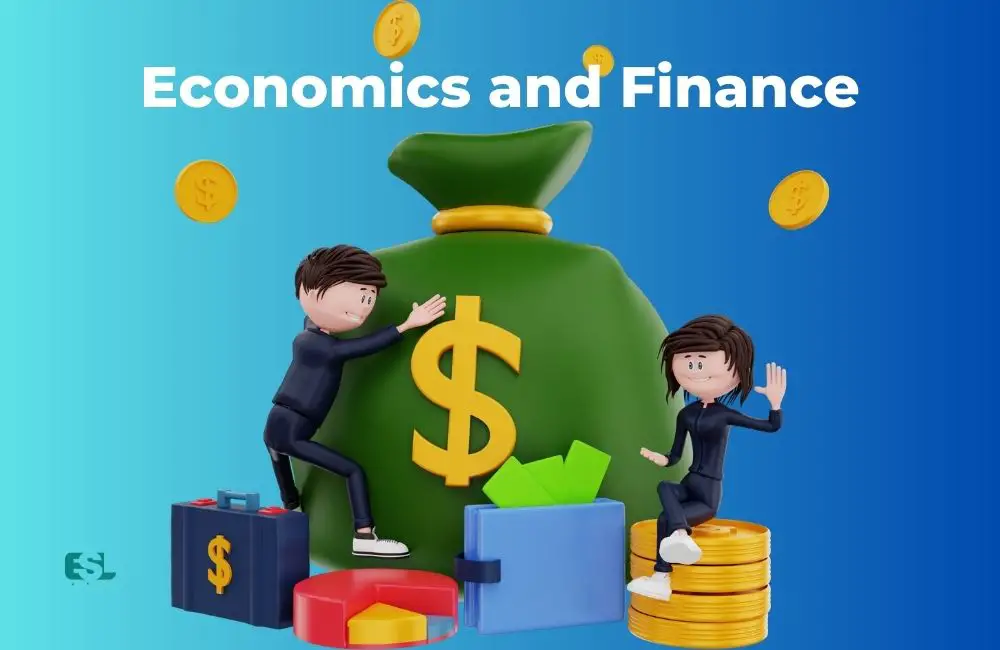Understanding the language of economics and finance can be daunting, especially for those new to the field. However, with the right knowledge and resources, grasping these concepts’s easier than ever.
Whether you’re studying economics, planning to start your own business, or just trying to make better financial decisions, a solid grasp of economic and financial terminology is essential. This article will provide you with an overview of key terms in economics and finance, broken down into different categories.
John Downes and Jordan Elliot Goodman have developed a great Dictionary of Finance and Investment Terms (Amazon Link) that I think one must have who is interested in elevating the vocabulary related to finance and economics.
Table of Contents
- 1. Basic Economics
- 2. Personal Finance
- 3. Investment Terms
- 4. Financial Markets
- Sample Conversation: Using Vocabulary Related to Economics and Finance
- Conclusion
- FAQ: Vocabulary Related to Economics and Finance
1. Basic Economics
This category covers fundamental concepts in the field of economics. Understanding these terms will give you a solid foundation for further economic study and analysis.
| Word/Phrase | Meaning/Usage | Example Sentences |
|---|---|---|
| Economy | The state of a country or region in terms of the production and consumption of goods and services | “The global economy is expected to recover this year.” |
| Inflation | The rate at which the general level of prices for goods and services is rising | “Inflation has been rising in recent months.” |
| Deflation | A decrease in the general price level of goods and services | “Japan has struggled with deflation for decades.” |
| Recession | A period of temporary economic decline during which trade and industrial activity are reduced | “Many countries faced a recession due to the COVID-19 pandemic.” |
| GDP (Gross Domestic Product) | The total value of goods produced and services provided in a country during one year | “The GDP of the country has been growing steadily.” |
| Unemployment rate | The percentage of the total labor force that is unemployed but seeking employment and willing to work | “The unemployment rate rose during the pandemic.” |
| Fiscal policy | Government policy regarding taxation, government spending, and public debt | “The government’s fiscal policy has focused on reducing public debt.” |
| Monetary policy | The process by which the monetary authority controls the supply of money for the purpose of promoting economic growth and stability | “The central bank has loosened its monetary policy to stimulate growth.” |
| Demand | The desire of consumers, clients, employers, etc. for a particular commodity, service, or other item | “There is a high demand for organic food products.” |
| Supply | The total amount of a specific good or service available to consumers | “The supply of affordable housing is not meeting demand.” |
| Trade | The action of buying and selling goods and services | “International trade plays a vital role in the economy.” |
If you are searching for an effective English language vocabulary builder, try Word Power Made Easy: The Complete Handbook for Building a Superior Vocabulary (Amazon Link). This time-tested classic has helped millions achieve mastery of English and improve their communication skills in business, the classroom, and in life.
2. Personal Finance
Personal finance encompasses all financial decisions and activities of an individual or household, including earning, saving, investing, and spending. Here are some essential terms to know.
| Word/Phrase | Meaning/Usage | Example Sentences |
|---|---|---|
| Savings account | A bank account that earns interest | “I have a savings account for my emergency fund.” |
| Checking account | A bank account that allows easy access to your money for your daily transactional needs | “I use my checking account for monthly bills and expenses.” |
| Interest rate | The proportion of a loan that is charged as interest to the borrower, typically expressed as an annual percentage of the loan outstanding | “The bank offered a lower interest rate on my mortgage.” |
| Credit score | A number assigned to a person that indicates to lenders their capacity to repay a loan | “A high credit score can help you get better rates on loans.” |
| Debt | Something, typically money, that is owed or due | “I have to pay off my student debt before I can think about buying a house.” |
| Mortgage | A loan to finance the purchase of real estate, usually with specified payment periods and interest rates | “I just got approved for a mortgage to buy my first home.” |
| Retirement plan | Financial strategies of saving, investment, and allocation of finances for retirement | “My employer offers a 401(k) retirement plan.” |
| Investment | The action or process of investing money for profit or material result | “I made my first investment in the stock market this year.” |
| Budget | An estimate of income and expenditure for a set period of time | “My monthly budget helps me manage my spending.” |
| Insurance | A contract, represented by a policy, in which an individual or entity receives financial protection or reimbursement against losses | “I have health insurance through my employer.” |
| Tax | A compulsory contribution to state revenue, levied by the government on workers’ income and business profits or added to the cost of some goods, services, and transactions | “I hired a professional to help with my taxes this year.” |
3. Investment Terms
Investing can be a significant part of personal finance and broader economic activity. These terms will help you understand the basics of investing and the language used in the investment world.
| Word/Phrase | Meaning/Usage | Example Sentences |
|---|---|---|
| Stock | The capital raised by a business or corporation through the issue and subscription of shares | “I bought stock in a technology company.” |
| Bond | A financial security that represents a promise to repay a fixed amount of funds | “Government bonds are considered a safe investment.” |
| Mutual fund | An investment program funded by shareholders that trades in diversified holdings and is professionally managed | “I invested in a mutual fund for my retirement savings.” |
| Dividend | A sum of money paid regularly (typically quarterly) by a company to its shareholders out of its profits (or reserves) | “The company announced it would pay a dividend to shareholders.” |
| Capital gain | A profit from the sale of property or an investment | “I had a significant capital gain from selling my house.” |
| Portfolio | A range of investments held by a person or organization | “My portfolio includes stocks, bonds, and real estate.” |
| Yield | The income return on an investment | “The yield on my bond investment has been steady.” |
| IPO (Initial Public Offering) | The first sale of stock by a company to the public | “The company’s IPO was very successful, and the stock price rose significantly.” |
| Securities | Tradable financial assets such as equities, bonds, and options | “The Securities and Exchange Commission regulates securities trading.” |
| Asset allocation | The implementation of an investment strategy that attempts to balance risk versus reward by adjusting the percentage of each asset in an investment portfolio | “My financial advisor helped me with my asset allocation.” |
| Market capitalization | The total dollar market value of a company’s outstanding shares of stock | “The market capitalization of the company has grown substantially over the past year.” |
4. Financial Markets
Financial markets provide a place for people and entities to buy and sell securities, commodities, and other fungible items. The following terms are important to understand when discussing financial markets.
| Word/Phrase | Meaning/Usage | Example Sentences |
|---|---|---|
| Stock market | A market in which securities are bought and sold | “The stock market has been very volatile recently.” |
| Bull market | A market in which share prices are rising, encouraging buying | “We’re currently in a bull market.” |
| Bear market | A market in which prices are falling, encouraging selling | “The bear market has caused many investors to sell their stocks.” |
| Exchange | A marketplace in which securities, commodities, derivatives, and other financial instruments are traded | “The New York Stock Exchange is the largest in the world.” |
| Index | A statistical measure of the changes in a portfolio of stocks representing a portion of the overall market | “The Dow Jones Industrial Average is a well-known index.” |
| Forex (Foreign Exchange) Market | The market in which currencies are traded | “The forex market is the largest and most liquid market in the world.” |
| Commodity | A raw material or primary agricultural product that can be bought and sold, such as copper or coffee | “The price of the commodity has risen due to increased demand.” |
| Derivative | A financial security with a value that is reliant upon or derived from, an underlying asset or group of assets | “Futures and options are types of derivatives.” |
| Equity | The value of an ownership interest in property, including shareholders’ equity, in a business | “Equity in a home is the value of the property minus the amount owed on it.” |
| Futures | Financial contracts obligating the buyer to purchase an asset (or the seller to sell an asset), such as a physical commodity or a financial instrument, at a predetermined future date and price | “I have a futures contract to buy wheat.” |
| Options | Contracts that give the holder the right, but not the obligation, to buy or sell an underlying asset at a predetermined price before or on a specified date | “He sold options on the stock in his company.” |
To improve your vocabulary in just 30 days, I recommend to my students an informative, fun, and accessible guide to utilizing powerful language. Millions of individuals have enhanced their academics, job skills, and confidence by dedicating just fifteen minutes daily to the exercises and tests of 30 Days to a More Powerful Vocabulary (Amazon Link), a top-selling. It offers step-by-step methods to bolster language prowess, discover compelling words, and daily vocabulary enhancement with pronunciation guidance.
Sample Conversation: Using Vocabulary Related to Economics and Finance
Situation: At a financial seminar, analyst Sarah is explaining some key concepts to a group of college students, among whom is Mark, an economics major.
Sarah: Good afternoon, everyone. Today, we’ll delve into the fascinating world of macroeconomics, focusing on the behavior of an economy as a whole rather than individual markets.
Mark: Sarah, I’ve often heard the term inflation. Can you explain how it impacts our daily lives?
Sarah: Great question, Mark. Inflation refers to the general increase in prices over time, which can erode the purchasing power of money. If your income doesn’t rise at the same rate as inflation, you might find it harder to buy the same goods and services as before.
Mark: And that’s related to the consumer price index (CPI), right?
Sarah: Exactly! The CPI measures the average change in prices over time that consumers pay for a basket of goods and services. It’s a key indicator to gauge inflation.
Mark: I’ve also come across fiscal policy. Can you shed some light on it?
Sarah: Certainly. Fiscal policy involves government decisions about taxation and public spending. It’s used to influence a country’s economic activity, such as stimulating growth during a recession.
Mark: So, how does that differ from monetary policy?
Sarah: Good distinction. While fiscal policy is about government revenue and expenditure, monetary policy involves managing interest rates and money supply, typically by a central bank, to control inflation and stabilize the economy.
Conclusion
Understanding economics and finance terminology can significantly improve your ability to make informed decisions about your personal finances and investments. These terms form the core language of economics and finance, and familiarity with them is essential for anyone looking to be more financially savvy.
Knowing these terms is a crucial first step, whether you’re a student, a budding entrepreneur, or just someone looking to manage your money better. So, start learning and expanding your financial vocabulary today.
FAQ: Vocabulary Related to Economics and Finance
1. What is macroeconomics?
Macroeconomics studies the behavior and performance of an economy as a whole. It analyzes aggregate changes and the factors influencing them, such as inflation, unemployment, and economic growth.
2. How does inflation affect an economy?
Inflation denotes the rising prices of goods and services over time. Moderate inflation can be a sign of a growing economy, but high inflation can erode purchasing power, destabilize economies, and lead to uncertainty.
3. What is the consumer price index (CPI) used for?
The CPI is a measure that assesses the average change in prices consumers pay for goods and services. It’s a crucial tool for identifying periods of inflation or deflation.
4. Can you explain fiscal policy?
Fiscal policy refers to government actions concerning taxation and spending to influence the country’s economic conditions, such as stimulating economic growth or curbing inflation.
5. How is monetary policy different?
Monetary policy concerns the management of interest rates and the total supply of money in circulation. It’s typically executed by the central bank and aims at achieving macroeconomic objectives like inflation control.
6. What are interest rates, and why are they vital?
Interest rates represent the cost of borrowing or the return on savings. They influence consumer spending, business investments, and the overall economic growth.
7. What does supply and demand mean in economics?
Supply and demand are fundamental concepts that determine the price of goods and services. When demand exceeds supply, prices rise, and when supply exceeds demand, prices drop.
8. How does economic growth impact a country?
Economic growth indicates the increase in the value of goods and services produced by an economy. Sustained growth can lead to improved living standards, more jobs, and increased wealth.
9. What role does the stock market play in finance?
The stock market allows companies to raise capital by issuing shares to the public. It provides investors a platform to buy and sell shares, influencing economic activity.
10. Can you describe foreign exchange?
Foreign exchange refers to the global marketplace for trading national currencies. Exchange rates fluctuate based on various factors, impacting international trade and investments.






